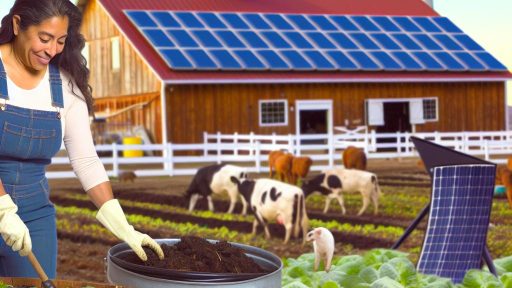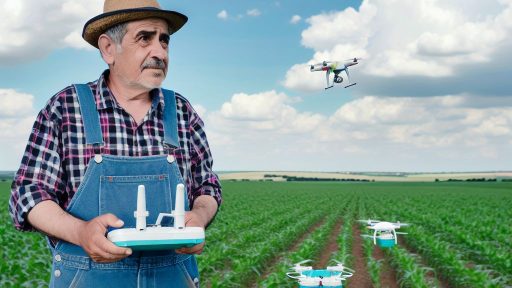Increased Crop Yields and Productivity
Significantly Higher Yields
Genetically modified (GM) crops can produce significantly higher yields compared to traditional varieties.
Farmers benefit from increased production without needing extra land.
This efficiency leads to better profitability for agricultural enterprises.
As a result, food scarcity becomes less of a concern in many regions.
Enhanced Resistance to Pests and Diseases
GM crops often possess traits that increase resistance to pests and diseases.
This resistance reduces the need for chemical pesticides.
Consequently, farmers save money on pest control while ensuring higher yields.
Moreover, healthier plants can contribute to more sustainable farming practices.
Improved Adaptability to Environmental Conditions
GM crops adapt better to unfavorable environmental conditions.
These traits include drought tolerance and salt resistance.
Farmers can cultivate crops in less-than-ideal soil conditions.
This adaptability ensures a more stable food supply even under climate stress.
Cost-Effective Cultivation Practices
Lower input costs are critical for farmers maintaining profitability.
GM crops often require fewer resources like water and fertilizer.
Farmers can allocate funds usually spent on inputs to other areas of their operations.
Transform Your Agribusiness
Unlock your farm's potential with expert advice tailored to your needs. Get actionable steps that drive real results.
Get StartedThis cost-effectiveness supports rural economic growth.
Long-Term Economic Benefits
The economic advantages of growing GM crops create sustained benefits over time.
Farmers can reinvest their profits into their farms and communities.
Improved agricultural productivity drives local economies forward.
As a result, the entire food supply chain experiences positive impacts.
Reduction in Agricultural Inputs and Costs
Lower Fertilizer Usage
Genetically modified crops often require fewer fertilizers.
This results in significant cost savings for farmers.
For example, crops engineered for nitrogen fixation need less nitrogen input.
Consequently, farmers can allocate resources more effectively.
Reduced Pesticide Application
Many GM crops are designed to be pest-resistant.
This trait minimizes the need for chemical pesticides.
As a result, farmers enjoy lower chemical costs and increased yields.
Also, reduced pesticide usage supports environmental sustainability.
Water Efficiency
Genetically modified crops can be engineered for drought resistance.
These crops require less water for optimal growth.
Farmers can thus save on irrigation costs.
This trait is particularly beneficial in arid regions.
Enhanced Crop Yield
Genetically modified crops tend to have higher yields.
Increased yield per acre maximizes land use efficiency.
Farmers can produce more food without expanding farmland.
Higher yields translate directly into greater income opportunities.
Time and Labor Savings
The use of GM crops can reduce the amount of time spent on farming activities.
This efficiency can lead to lower labor costs over time.
Additionally, less frequent applications of fertilizers and pesticides save labor hours.
Showcase Your Farming Business
Publish your professional farming services profile on our blog for a one-time fee of $200 and reach a dedicated audience of farmers and agribusiness owners.
Publish Your ProfileFarmers can focus more on quality control and planning.
Enhanced Resistance to Pests and Diseases
Significance of Pest Resistance
Genetically modified (GM) crops exhibit enhanced resistance to various pests.
This feature reduces the need for chemical pesticides.
Farmers can thus lower their production costs significantly.
Furthermore, pest-resistant crops boost yields during infestations.
Impact on Disease Resistance
In addition to pests, GM crops can resist certain diseases effectively.
Plant pathogens are less likely to affect these modified varieties.
This resistance leads to a more stable production schedule for farmers.
Moreover, it helps in maintaining the quality of the harvest.
Economic Benefits
The reduction in chemical use lowers overall farming expenses.
Higher yields also translate into increased revenue for farmers.
Thus, growers can invest more in sustainable practices.
As a result, the community sees enhanced food security.
Environmental Considerations
Growing GM crops can lead to improved biodiversity.
Less pesticide use benefits surrounding ecosystems.
This shift may contribute to healthier soil and water sources.
Sustainable farming practices become more achievable.
Learn More: The Role Of Biotechnology In Pest Management
Drought Tolerance and Climate Resilience
Importance of Drought Tolerance
Drought tolerance is vital in today’s changing climate.
Crops engineered for drought can thrive with limited water.
This adaptation leads to increased yields in arid regions.
Farmers face fewer losses during long dry spells.
As a result, food security improves significantly.
Benefits of Climate Resilience
Climate-resilient crops can adapt to fluctuating weather patterns.
These crops reduce dependency on irrigation systems.
Farmers can cultivate more diverse crops year-round.
This diversity enhances soil health and reduces pest pressure.
Moreover, climate resilience contributes to sustainable farming practices.
Economic Impact
Growing drought-tolerant crops can lower agricultural costs.
Farmers save money on water usage and irrigation infrastructure.
These savings translate into higher profit margins.
In addition, resilient crops can attract premium market prices.
Investing in biotechnology creates new job opportunities in agriculture.
Case Studies of Success
Several regions have successfully adopted genetically modified crops.
For example, the introduction of drought-tolerant maize in Sub-Saharan Africa has yielded impressive results.
Farmers reported a significant increase in harvests.
Similar success has been noted with climate-resilient soybeans in Brazil.
These successes highlight the potential of biotechnology in agriculture.
Learn More: Sustainable Crop Rotation Methods Enhanced by Technological Advances
Potential to Lower Food Prices
Increased Crop Yields
Genetically modified crops often achieve higher yields compared to traditional varieties.
Showcase Your Farming Business
Publish your professional farming services profile on our blog for a one-time fee of $200 and reach a dedicated audience of farmers and agribusiness owners.
Publish Your ProfileThis increase in yield reduces the cost of production per unit of food.
Consequently, farmers can sell their produce at lower prices.
Improved varieties also withstand pests and diseases better.
This resilience reduces the need for costly pesticides and herbicides.
Reduced Agricultural Inputs
Genetically modified crops require fewer agricultural inputs overall.
For example, they often need less water than conventional crops.
Additionally, they can be engineered for nutrient efficiency.
This leads to substantial cost savings for farmers.
As a result, lower production costs can translate into lower prices for consumers.
Market Stability
Higher production efficiency fosters greater market stability.
Consistent supply levels help prevent price spikes during shortages.
Moreover, stable prices benefit consumers and food retailers alike.
Consumers can plan their budgets with more confidence.
In turn, retailers can manage inventory more effectively.
Long-term Economic Benefits
The adoption of genetically modified crops supports long-term economic growth.
Lower food prices can improve food access for low-income households.
Increased food security leads to healthier populations, enhancing productivity.
Moreover, farmers can invest savings into improving their businesses.
This evolutionary agricultural model strengthens entire economies over time.
Discover More: Controlled Environment Agriculture Systems for Efficient Farming

Economic Benefits for Farmers and Communities
Increased Yields
Farmers experience significant yield increases when they grow genetically modified (GM) crops.
These crops are designed to resist pests and diseases effectively.
Consequently, producers can harvest more per acre compared to traditional varieties.
Furthermore, higher yields directly translate into increased income for farmers.
Cost Savings on Inputs
GM crops often require fewer inputs such as water, fertilizers, and pesticides.
This reduction in input use lowers overall production costs for farmers.
Many farmers report that they save considerable amounts on pest control measures.
As a result, these savings help enhance profit margins.
Enhanced Crop Resilience
GM crops typically offer improved resilience to environmental stress factors.
These include drought, flooding, and extreme temperatures.
By using such crops, farmers can stabilize their production levels.
Additionally, this stability helps secure their financial future.
Expansion of Market Opportunities
The adoption of GM crops opens new markets for farmers.
Many consumers are seeking products that are environmentally friendly.
Farmers can tap into these markets by producing GM crops with specific traits.
This helps build a sustainable future for both farmers and local communities.
Community Economic Growth
Growing GM crops can stimulate local economies significantly.
Farmers’ increased profits lead to more spending in local businesses.
This higher economic activity fosters job creation in the region.
Consequently, entire communities benefit from the economic ripple effects.
Showcase Your Farming Business
Publish your professional farming services profile on our blog for a one-time fee of $200 and reach a dedicated audience of farmers and agribusiness owners.
Publish Your ProfileInvestment in Agricultural Technology
The success of GM crops encourages further investment in agricultural technology.
This investment leads to research and development of even better crop varieties.
Additionally, farmers who adopt GM crops often become more innovative.
Increased innovation can strengthen the agricultural sector as a whole.
Uncover the Details: Integrating Drones Into Sustainable Farming Practices
Impact on Export Opportunities and Market Access
Increased Global Demand
Genetically modified crops meet the rising global food demand.
They provide higher yields than traditional crops.
This advantage positions exporters favorably in global markets.
Countries with food shortages often seek these products.
Improved Quality and Shelf Life
Genetically modified crops frequently exhibit improved quality.
They often have extended shelf lives compared to non-modified variants.
This characteristic appeals to international importers.
Higher quality products enhance market competitiveness.
Regulatory Synergy
Some countries have established harmonized regulations for genetically modified organisms.
This synergy facilitates easier access to markets.
Compliance becomes simpler, reducing barriers for exporters.
As a result, farmers experience increased trade flows.
Enhanced Export Opportunities in Emerging Markets
Emerging markets show growing interest in genetically modified crops.
These regions often lack sufficient agricultural productivity.
Export opportunities expand as farmers seek innovative solutions.
Success in these markets can drive significant economic growth.
Consumer Awareness and Acceptance
Consumer awareness campaigns promote the benefits of genetically modified crops.
This shift leads to increased acceptance in various regions.
As acceptance grows, so do export possibilities.
Farmers thrive in markets with informed consumers.
Collaboration and Trade Partnerships
Partnerships between countries enhance access to genetically modified crops.
Collaborative research initiatives can boost these efforts.
For instance, trade agreements often support agricultural innovation.
Such partnerships create mutually beneficial opportunities for all parties.
Long-term Sustainability of Agricultural Practices
Economic Viability
Genetically modified crops often lead to higher yields per acre.
This increase helps farmers maximize their profits over time.
Additionally, reduced need for pesticides can lower operational costs.
Farmers experienced significant savings, thus enhancing their economic viability.
Moreover, these crops can withstand extreme weather conditions.
This resilience provides farmers a more stable income during unpredictable seasons.
Reduced Environmental Impact
Growing genetically modified crops can significantly reduce greenhouse gas emissions.
This occurs as fewer tillage operations are required.
Consequently, soil health improves, supporting future agricultural productivity.
Farmers often report less soil erosion compared to conventional practices.
Healthy soil fosters better crop growth, further enhancing farm sustainability.
Showcase Your Farming Business
Publish your professional farming services profile on our blog for a one-time fee of $200 and reach a dedicated audience of farmers and agribusiness owners.
Publish Your ProfileResource Efficiency
Genetically modified crops utilize water more efficiently.
This efficiency is crucial in regions facing water scarcity.
In addition, they often require fewer chemical inputs.
Farmers can reduce their reliance on synthetic fertilizers and pesticides.
This not only cuts costs but also promotes ecological balance.
Market Access and Global Demand
As global demand for food increases, genetically modified crops present a solution.
They can meet the nutritional needs of a growing population.
Furthermore, regions benefiting from these crops gain access to newer markets.
This access can lead to enhanced profitability for farmers on a global scale.
Cultivating genetically modified crops aids in long-term agricultural sustainability.




